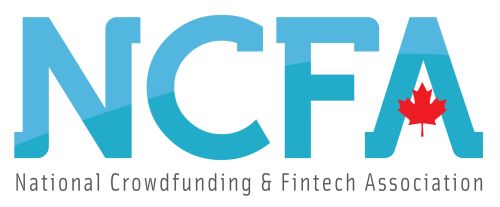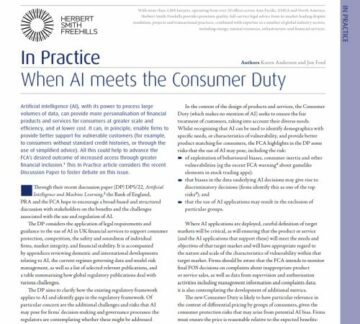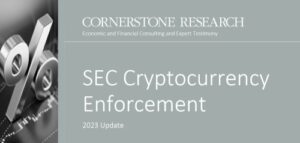Regulation | Dec 11, 2023

 Image: Unsplash/Mimi Thian
Image: Unsplash/Mimi ThianSEC’s Growing Concerns of the Use of AI by Investment Advisors
According to the Wall Street Journal, the SEC, under the leadership of Chair Gary Gensler, has initiated a series of inquiries into the use and oversight of AI by investment advisers. This move reflects Gensler’s ongoing skepticism about the technology’s role in the financial sector. The SEC’s examinations division is particularly interested in AI-related marketing documents, algorithmic models for managing client portfolios, third-party providers, and compliance training.
See: Gary Gensler Speech to the National Press Club: “AI: The Most Transformative Technology of Our Time”
The SEC’s investigation aims to understand the full spectrum of AI’s application in investment advisory, from algorithmic decision-making to client interaction and risk assessment. It was based on an advisory committee’s recommendation for the SEC to amend existing rules to address potential conflicts arising from AI usage.
A report from BenefitsPro underscores the widespread adoption of AI in the financial services industry. According to research by the professional association Million Dollar Roundtable, over 72% of advisors leverage AI for various professional purposes. This statistic demonstrates the significant penetration of AI in the industry, necessitating a closer look by regulatory bodies like the SEC.
Implications for Investment Advisors
- Investment advisors will likely face heightened scrutiny from the SEC. This means advisors must be prepared to demonstrate that their use of AI complies with existing regulations and does not mislead or disadvantage clients.
- With the SEC focusing on AI-related marketing materials, algorithmic models, and compliance training, investment advisors will need to enhance their compliance infrastructure. This could involve more rigorous testing and validation of AI models, ensuring they are transparent, fair, and do not introduce undue risk.
See: Proposed SEC Rules on Predictive Data Analytics for Dealer-Brokers and Investment Advisors
- Advisors might be required to provide more detailed disclosures about how they use AI, including the data sources, methodologies, and decision-making processes involved. This transparency is crucial for maintaining client trust and regulatory compliance.
- Firms using AI will need to invest in technological upgrades and employee training to ensure that their staff understands and can effectively manage AI tools. This includes understanding the limitations and potential biases in AI systems.
- As AI plays a more significant role in decision-making, ethical considerations become paramount. Advisors must ensure that AI is used in a way that aligns with the best interests of their clients, maintaining trust and integrity in client relationships.
- The SEC’s probe could lead to new regulations specifically targeting the use of AI in investment advisory. Advisors should be prepared for potential regulatory changes and be proactive in adapting to new requirements.
- Advisors will need to focus more on risk management strategies related to AI, including the risks of algorithmic bias, data privacy concerns, and the reliability of AI-driven decisions.
- There may be a growing need to educate clients about the role and implications of AI in their investment strategies, helping them understand both the benefits and limitations of AI-driven advisory services.
Summary
In summary, the SEC’s focus on AI’s use and oversight of investment advisors is likely to bring about a mix of challenges and opportunities, requiring advisors to navigate a complex landscape of technological innovation, regulatory compliance, and ethical considerations. This investigation not only highlights the potential risks associated with AI in finance.
See:
Will Canada’s New Voluntary AI Code Hinder Innovation?
European Union’s Landmark AI Regulatory Deal
Industry Resists SEC’s Oversight on AI in Finance

 The National Crowdfunding & Fintech Association (NCFA Canada) is a financial innovation ecosystem that provides education, market intelligence, industry stewardship, networking and funding opportunities and services to thousands of community members and works closely with industry, government, partners and affiliates to create a vibrant and innovative fintech and funding industry in Canada. Decentralized and distributed, NCFA is engaged with global stakeholders and helps incubate projects and investment in fintech, alternative finance, crowdfunding, peer-to-peer finance, payments, digital assets and tokens, artificial intelligence, blockchain, cryptocurrency, regtech, and insurtech sectors. Join Canada’s Fintech & Funding Community today FREE! Or become a contributing member and get perks. For more information, please visit: www.ncfacanada.org
The National Crowdfunding & Fintech Association (NCFA Canada) is a financial innovation ecosystem that provides education, market intelligence, industry stewardship, networking and funding opportunities and services to thousands of community members and works closely with industry, government, partners and affiliates to create a vibrant and innovative fintech and funding industry in Canada. Decentralized and distributed, NCFA is engaged with global stakeholders and helps incubate projects and investment in fintech, alternative finance, crowdfunding, peer-to-peer finance, payments, digital assets and tokens, artificial intelligence, blockchain, cryptocurrency, regtech, and insurtech sectors. Join Canada’s Fintech & Funding Community today FREE! Or become a contributing member and get perks. For more information, please visit: www.ncfacanada.org
Related Posts
- SEO Powered Content & PR Distribution. Get Amplified Today.
- PlatoData.Network Vertical Generative Ai. Empower Yourself. Access Here.
- PlatoAiStream. Web3 Intelligence. Knowledge Amplified. Access Here.
- PlatoESG. Carbon, CleanTech, Energy, Environment, Solar, Waste Management. Access Here.
- PlatoHealth. Biotech and Clinical Trials Intelligence. Access Here.
- Source: https://ncfacanada.org/sec-examines-ai-impact-on-investment-advising/
- :has
- :is
- :not
- 11
- 150
- 2018
- 225
- 300
- 32
- a
- About
- According
- address
- Adoption
- advising
- advisor
- advisors
- advisory
- advisory services
- affiliates
- AI
- AI models
- AI systems
- aims
- algorithmic
- algorithmic bias
- Aligns
- alternative
- alternative finance
- an
- analytics
- and
- Application
- ARE
- artificial
- artificial intelligence
- assessment
- Assets
- associated
- Association
- based
- BE
- become
- benefits
- BEST
- bias
- biases
- blockchain
- bodies
- both
- bring
- by
- cache
- CAN
- Canada
- Chair
- challenges
- client
- clients
- closely
- closer
- club
- code
- committee
- community
- complex
- compliance
- Concerns
- conflicts
- considerations
- could
- create
- Crowdfunding
- cryptocurrency
- data
- Data Analytics
- deal
- dec
- decentralized
- Decision Making
- demonstrate
- demonstrates
- detailed
- digital
- Digital Assets
- Disadvantage
- Disclosures
- distributed
- Division
- do
- documents
- does
- Dollar
- ecosystem
- educate
- Education
- effectively
- Employee
- engaged
- enhance
- ensure
- ensuring
- Ether (ETH)
- ethical
- European
- european union
- Examines
- existing
- fair
- finance
- financial
- financial innovation
- Financial sector
- financial services
- fintech
- Focus
- focusing
- For
- from
- full
- full spectrum
- funding
- funding opportunities
- Gary
- Gary Gensler
- Gensler
- get
- Global
- Government
- Growing
- heightened
- helping
- helps
- High
- highlights
- hinder
- How
- http
- HTTPS
- human
- image
- Impact
- implications
- in
- includes
- Including
- industry
- information
- initiated
- Innovation
- innovative
- Inquiries
- Insurtech
- integrity
- Intelligence
- interaction
- interested
- interests
- into
- introduce
- Invest
- investigation
- investment
- investment advisors
- investment advisory
- involve
- involved
- IT
- Jan
- jpg
- landmark
- landscape
- lead
- Leadership
- Leverage
- like
- likely
- limitations
- Look
- maintaining
- manage
- management
- managing
- Market
- Marketing
- materials
- max-width
- May..
- means
- member
- Members
- methodologies
- might
- million
- Million dollar
- mix
- models
- more
- most
- move
- must
- National
- National Press Club
- Navigate
- Need
- networking
- New
- of
- on
- ongoing
- only
- opportunities
- or
- our
- Oversight
- Paramount
- particularly
- partners
- payments
- peer to peer
- penetration
- perks
- plato
- Plato Data Intelligence
- PlatoData
- plays
- please
- portfolios
- potential
- predictive
- prepared
- press
- Proactive
- probe
- processes
- professional
- projects
- proposed
- providers
- provides
- purposes
- reflects
- Regtech
- regulations
- regulatory
- Regulatory Compliance
- related
- Relationships
- replace
- required
- Requirements
- research
- rigorous
- Risk
- risk assessment
- risk management
- risks
- Role
- rules
- s
- scrutiny
- SEC
- sector
- Sectors
- Series
- Services
- should
- significant
- Skepticism
- Sources
- specifically
- Spectrum
- speech
- Staff
- stakeholders
- Stewardship
- strategies
- street
- SUMMARY
- Systems
- targeting
- technological
- Technology
- technology's
- Testing
- that
- The
- their
- Them
- they
- third-party
- this
- thousands
- to
- today
- Tokens
- tools
- Training
- transformative
- transparent
- truly
- Trust
- under
- underscores
- understand
- understanding
- understands
- union
- Unsplash
- upgrades
- Usage
- use
- used
- using
- validation
- various
- vibrant
- Visit
- voluntary
- was
- Way..
- widespread
- will
- with
- works
- WSJ
- zephyrnet











